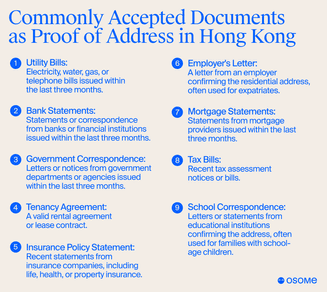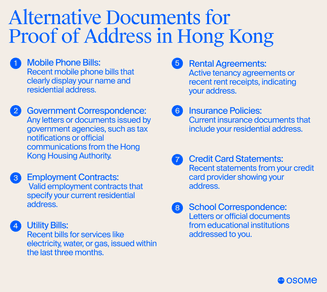What Is Proof of Address and How To Obtain One Easily and Quickly in Hong Kong
- Modified: 2 July 2025
- 8 min read
- Starting a Company


Gabi Bellairs-Lombard
Author
Gabi creates content that inspires. She's spent her career writing compelling website copy, and now she specialises in product marketing copy. As the voice of our products and features, Gabi makes complex business finance and accounting topics easy to understand. Her top priority is ensuring that her words impact and inspire her readers.
Proof of address is a document that verifies your residential address, crucial for various company processes in Hong Kong. Common examples include a bank statement, utility bills, and lease agreements. Among Hong Kong's most important official documents, this crucial document is often required for GST registration, ensuring your residential details are complete and accurate. If you obtain proof of address, you can can streamline the process of opening bank accounts and registering a new entity. So, let's cover what proof of address is, why it’s important, and how you can easily obtain one in Hong Kong.
Key Takeaways
- Proof of address in Hong Kong is essential for a complete range of administrative tasks, such as opening a bank account, dealing with government offices, and ensuring company compliance by confirming your current address.
- Commonly accepted documents to prove address include recent utility bills, bank statements, and lease agreements, all of which must clearly display your name and address proof.
- Alternative documents like phone bills, government correspondence, or an employment contract can also serve as residency address proof, with special circumstances requiring creative solutions such as requesting paper copies of electronic bills. Ensuring that these documents are approved and processed correctly to provide appropriate proof can determine the success of your GST registration and other related procedures.
What Is Proof of Address in Hong Kong?
In Hong Kong, a valid proof of address serves as a foundation for an array of administrative tasks—from opening bank accounts to slicing through red tape at government offices. But what exactly is this proof? At its core, it’s a document that validates your current home address, ensuring that you are precisely where you claim to be.
This is a crucial component that streamlines your interactions with the Hong Kong Housing Society, the Hong Kong Housing Authority, and other entities that make this city tick.
Additionally, if you are looking to establish your business presence, consider our comprehensive company registration services to ensure every step of your incorporation process is seamlessly managed.
Commonly Accepted Documents as Proof of Address
In Hong Kong, the most commonly accepted proof of your residential story includes various utility bills, bank statements, and a lease agreement or a tenancy agreement. Each of these documents plays a unique role in painting a picture of life in your current home address.

Utility bills
Along with address proof, utility bills also fit within the requirements set forth by most authorities. Imagine them as receipts of your daily life—gas, electric, water, internet, and landline telephone bills—all showcasing your commitment to your current abode, with electricity bills serving as a primary example. To ensure that these bills remain valid as address proof, they must be recent, typically issued within the last three months, and clearly display your address, leaving no room for doubt. These bills are essential for GST registration, confirming your address, and ensuring compliance with local regulations. Credit card statements from your credit or debit cards can also serve as valid address proof, provided they meet the same criteria.
Bank statements
Whether you access it via online banking or receive them through the mail, a bank statement or credit card statement offers a credible and detailed account of your financial activities over the last 12 months.
Most authorities require documents issued within the last three months to ensure the information is current.
Lease agreements
For the urban nomads and settlers alike, the lease agreement is akin to a sacred scroll—detailing your domain within the city’s confines. Particularly for those who have recently traded skylines, a tenancy agreement immediately becomes an anchor, affirming your new residency with every clause and condition. Lease agreements are vital for GST registration, confirming your residential address and ensuring compliance with local regulations.
This serves as a gateway to a world of services and amenities that require a local touchstone, including opening a bank account and registering a new entity. This helps avoid any liabilities such as stamp duty and ensures that all registration details are accurate and complete.
Criteria for Valid Proof of Address
Now, not all documents are created equal when it comes to the art of validating your abode. There’s a checklist that must be ticked off for your documents to be regarded as acceptable proof. It’s essential that the documents are up-to-date, typically within three to six months of the current date, and bear your name as the lead character at the given address.
These documents must be transparently dated, legible, and free from any alterations that would mar their credibility.
Example
You submit a utility bill dated five months ago, but your bank rejects it—it’s past the acceptable timeframe. Instead, you provide a recent internet bill issued last month, showing your full name and address clearly. This time, it’s accepted with no issues. Staying within the date range and ensuring clarity makes all the difference.
Alternative Documents for Proof of Address
But what if utility bills, statements from your bank account, or a lease agreement are not available? You can also consider using:
- Financial statements from licensed money lenders or insurance companies
- Legal documents proving property ownership
- Certifications from estate management agencies or your place of employment
Each of these documents, while perhaps not the first choice, can still play a crucial role in proving your residency in Hong Kong.

Mobile phone bills
Mobile phone bills can also serve as a marker of our residence. As long as your phone bill details your name and current address, it can be a contender in the roster of valid proof. These bills can be used for GST registration and confirming your residential details. However, the acceptance of these bills can vary between institutions, so it’s essential to confirm whether your mobile bill will be approved for your specific need.
Correspondence from government agencies
There’s a certain gravitas that comes with documents issued by the government, especially an estate management agency. Tax demand notes, government rent demand notes, and documents from the Hong Kong Housing Authority are the gold standard of proof, carrying inherent trust and authority for tax payment verification.
When a relevant estate management agency, as one of the government departments, puts its stamp on a business registration certificate, it carries an unmistakable weight of authenticity, much like that of an assessment authority. Such documents are essential for GST registration, confirming your address, and ensuring compliance with local regulations. They help determine eligibility for various services and provide a solid foundation for your residential proof.
Government-issued documents like tax demand notes or letters from estate management agencies in Hong Kong are the most trusted proof of address. Using these can help speed up business registrations and ensure smooth compliance with local regulations.
Employment contracts
Employment contracts or certifications from your employer that confirm your residency address can serve as a sturdy pillar of proof in Hong Kong. For those whose abode is provided by their employer, these documents become an irrefutable declaration of where you lay your head at night.
Special Circumstances for Obtaining Proof of Address
Life’s script often takes unexpected turns, and so too can the process of obtaining proof of address. There are special circumstances to consider, such as living with family, staying in temporary lodgings like hotels, and even modern preferences like paperless billing. For instance, if you're living with family, a marriage certificate or a salary statement can help prove residency. Staying in hotels might require documents from a government agency or a temporary residence permit. In each of these scenarios, navigating the path to provide proof requires a bit of creativity and knowledge of what alternatives exist for acceptable proof.
Recently moved
Promptly updating your address with utility companies, banks, and the post office (or postal service) is your next move, transforming new bills and agreements into freshly minted proof of your current residential address. Additionally, notifying the Hospital Authority and updating your mandatory provident fund details can further solidify your proof of address. Ensuring all relevant institutions have your updated information is crucial for a smooth transition.
Living with family members
Your family member’s utility bill, combined with a marriage certificate or a contract that proves your relationship, can coalesce into a cohesive proof of your residence, especially if it's an immediate family member.
Banks and other institutions often recognise the strength of family ties and may accept this composite as a reflection of your current living situation. Additionally, updating your address with local universities and ensuring your information is accurate with approved trustees can further validate your proof of address.
Paperless preferences
Those with paperless preferences may wonder how to manifest a physical proof of address. The solution lies in requesting a paper copy of what typically arrives in your inbox—electronic bills and statements from service providers can be transmuted into tangible documents upon request. For instance, converting your internet services and autotoll local companies' electronic bills into printed copies can provide the necessary proof. Ensuring these documents are accepted by the Home Affairs Department and other relevant institutions is crucial for validating your address.
Importance of Proof of Address
Proof of address is the cornerstone of establishing your place in society, a key that unlocks essential services, benefits, and everyday activities provided by both government and private institutions. It’s a beacon that will confirm your eligibility and set an application date for address-proof administered services such as:
- enrolling in local universities
- applying for a driver’s license
- opening a bank account
- applying for a passport
- registering to vote
- accessing healthcare services through the Hospital Authority
- applying for government assistance programs
- securing internet services
Proof of address also can be vital in obtaining documents from the Home Affairs Department. This humble yet powerful document confirms your presence and stability in the community, ensuring you can access all necessary services and benefits.
Summary
Proof of address is a thread that weaves through the fabric of daily activities. For seamless company registration services and expert guidance in navigating Hong Kong's administrative landscape, trust Osome to be your reliable partner. Whether you need assistance with an employment contract, updating your mandatory provident fund, or obtaining a residence permit, feel free to reach out!






